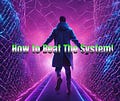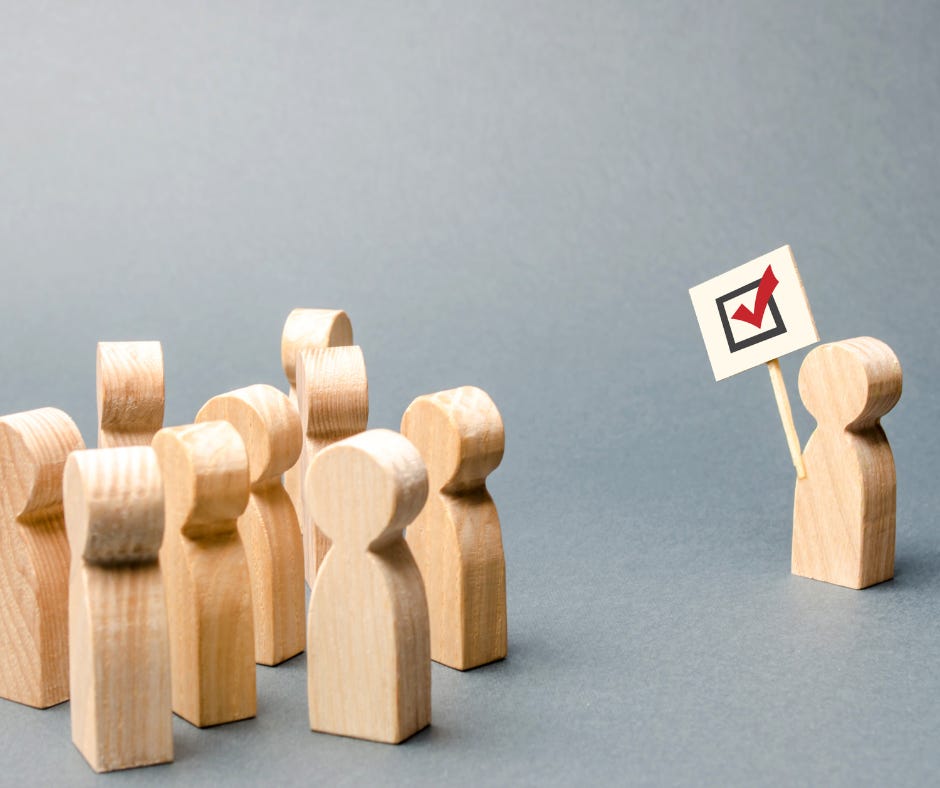Let’s first wake up and smell the reality…that the deck is stacked, everything is rigged, and they are out to get you.
What am I talking about?
The following systems and industries are rigged to cheat you, to suppress you, to control and manipulate you, and ultimately to discard you once you are of no further value.
The Healthcare System
is all about making money at your expense. It’s a complete joke as the system is intentionally engineered to keep you sick, get you addicted, and break you financially.
There is no long-term financial interest in converting sickness or addiction into health and well-being, however, there is a huge financial upside to perpetuating sickness, pain and addiction for as long as possible.
Rather than simplify and focus on both efficiency and effectiveness, the healthcare system is intentionally designed to be complex, confusing and manipulative.
It’s a breeding ground for adversarial rather than collaborative relationships as good claims are intentionally denied, and patients are forced to fight for the care they pay for.
Pharmaceutical and Health Insurance companies have invested billions of dollars with powerful Lobbyist Groups to work the system to buy Politicians, manipulate the media, and deceive the public.
Along the way, they have fine-tuned their true core competency which is marketing.
Doctors are miserable, buried in paperwork, and constantly dealing with skyrocketing malpractice insurance rates. Patients are overwhelmed, under-appreciated and little more than pawns in a big shell game, and the executives and shareholders are reaping huge financial rewards.
Avoiding the traditional healthcare system and focusing on home-based treatments using natural remedies, self-care, and preventive approaches is a powerful way to gain more control over your health. While there are certain medical conditions that do require professional care, for many common illnesses and health maintenance, adopting a holistic, home-based approach can reduce dependence on the conventional healthcare system. Here's a guide on how to do that safely and effectively:
Learning Basic First Aid and Emergency Care: Understanding how to manage minor injuries, wounds, burns, and sprains at home using a well-stocked first aid kit.
Using Herbal and Natural Remedies: Incorporating herbs, plants, and natural supplements that promote healing, boost the immune system, and address common ailments like colds, headaches, digestive issues, and inflammation.
Preventive Care Through Nutrition: Maintaining a healthy, balanced diet rich in vitamins, minerals, and whole foods to prevent disease and reduce the need for medical intervention.
Building a Home Medicine Cabinet: Stockpiling natural remedies and over-the-counter medications for common issues (e.g., fever, allergies, pain), while being mindful of expiration dates and correct usage.
Adopting a Holistic Health Routine: Regular physical exercise, stress management and proper sleep patterns to maintain overall wellness and prevent chronic health issues.
Developing DIY Health Monitoring Skills: Learning to monitor vital signs like blood pressure, temperature, and glucose levels with home tools to track health and identify when external medical help might be necessary.
Creating a Health Journal: Keeping a record of symptoms, home treatments, and their effects to track progress and adjust remedies when needed.
Seeking Community and Online Support: Engaging with like-minded individuals in health forums or local groups that exchange knowledge and resources on home-based healthcare practices.
The Banking System
is one big scam. The value of your money, interest rates for loans, availability of jobs, and the rate of home foreclosures are all decided by a small group of elite private bankers who run the Federal Reserve.
Contrary to common belief, the Federal Reserve – the Central Bank in the U.S. – is not a government agency.
It’s privately owned, operated and 100% controlled by bankers and therefore is operated for the financial gain of the bankers over the people rather than for the good of the people. The word “Federal” was used only to deceive the people.
How did this happen? Here are the cliff notes…
Woodrow Wilson was elected (selected is a more appropriate word) as the 28th President of the United States in 1913.
The previous year, Wilson met with a small group of wealthy private bankers who presented him with an “offer he couldn’t refuse”. Wilson swore in secret that in exchange for political and financial support from the Rockefeller-Morgan bankers, he would support the banker’s Federal Reserve scam and push for the first-ever progressive income tax on the American people.
President Wilson knew what he did was wrong. After serving the dark forces, and dancing with the devils he would later lament in his diary:
“I am a most unhappy man. I have unwittingly ruined my country. A great industrial nation is controlled by its system of credit… all our activities are in the hands of a few men. We have come to be one of the worst ruled, one of the most completely controlled and dominated Governments in the civilized world, no longer a Government by free opinion, no longer a Government by conviction and the vote of the majority, but a Government by the opinion and duress of a small group of dominant men.”
How to Avoid the Traditional Banking System and Manage Your Finances Independently
This strategy allows individuals to gain financial independence, minimize their interaction with traditional banking institutions, and maintain control over their wealth in a system built on decentralization, transparency, and community support.
Building Wealth Through Precious Metals and Tangible Assets: Instead of holding money in bank accounts, individuals can store wealth in tangible assets like gold, silver, real estate, or other commodities that hold intrinsic value and are less susceptible to market manipulation.
Engaging in Decentralized Finance (DeFi): DeFi platforms offer financial services like loans, savings accounts, and investments without the need for traditional banks. Smart contracts on blockchain networks allow for transparent and automated transactions, cutting out middlemen and fees.
Utilizing Cash: Relying on cash for daily expenses helps avoid tracking and fees associated with debit or credit cards. In digital form, prepaid cards or alternative payment systems can offer more privacy and autonomy.
Building a Self-Sufficient Financial Ecosystem: Developing personal financial strategies such as budgeting, saving, and investing in decentralized platforms helps reduce dependence on banks for everyday financial needs.
Using Cryptocurrency for Transactions and Savings: Cryptocurrencies like Bitcoin, Ethereum, and stablecoins enable peer-to-peer transactions without the need for banks, providing a secure and decentralized method of transferring and storing money.
The Political System
is fueled by institutionalized bribery. Our government is no longer by the people, for the people. Powerful lobbyists, corporations and wealthy people with deep pockets exert a large degree of control over those in office, drowning out the voices of all other citizens.
The Political System has taken a turn down elitist lane and we’ve become a country (and world) led by a small dominant class comprised of powerful members, economic elites who exert total control over the general population — an oligarchy.
Politicians now represent the rich and powerful, not the average citizen. Policies are formed more by corporations and special interest groups than by politicians properly representing the will of the general people.
Sadly, money has become the criteria for who makes it as an elected official. Politicians are rewarded not for their ability to govern, but by their ability to fund raise.
Avoid the Traditional Political System and Build a Self-Sufficient Community
Participating in Local Community Organizing: Engage with local grassroots movements, community groups, and cooperatives that focus on addressing local issues without waiting for political intervention.
Creating Alternative Governance Structures: Establish self-governing bodies within communities, such as councils or assemblies that operate independently of formal political systems. These structures can make decisions collaboratively and address community needs directly.
Utilizing Social Media and Digital Platforms: Harnessing the power of social media to raise awareness, share information, and organize campaigns against corrupt practices. Online platforms (Twitter/X, Telegram) can amplify voices and connect like-minded individuals who are dedicated to fighting political corruption.
Promoting Transparency and Accountability: Advocating for policies that enhance transparency in government spending, lobbying, and campaign financing. Supporting organizations that push for open data initiatives and anti-corruption legislation helps create a more accountable political environment.
Supporting Independent Media and Investigative Journalism: Promoting and funding independent media outlets that investigate corruption and hold politicians accountable. These entities play a crucial role in uncovering wrongdoings and providing a platform for public discourse.
As a full-time researcher, I rely on your support. If you find my work valuable, I kindly invite you to consider subscribing to the paid version of my newsletter. My goal is to continue providing well-researched content, educating you, and providing exceptional value through my work.
Educating and Empowering Others: Conducting workshops, seminars, and discussions to inform citizens about their rights, the political process, and the importance of civic engagement. An informed populace is better equipped to challenge corruption and demand accountability.
Using Alternative Economic Systems: Supporting local economies through cooperatives, bartering, and community currencies to reduce reliance on government systems and build resilience against corruption. This approach emphasizes economic independence from corrupt political structures.
By adopting these strategies, individuals can effectively sidestep corrupt political systems, promote accountability, and work towards a more transparent, equitable, and just governance structure that genuinely represents the people's interests.
The Food System
is unhealthy, unsustainable and completely unethical. Most of the problems in the food system stem from one giant problem: Concentration of power, land, wealth, and political influence in the hands of a few large players who have gamed the system for their benefit.
Monsanto’s seed and food dictatorship is based on corrupting regulatory processes by lobbying politicians to oppose health reforms, manipulating science and research findings, destroying farmland and deceiving the public.
The world’s food system is often influenced by big companies that prioritize profit over health and sustainability. Many people feel that this system is not working for them. Here are some simple ways to avoid the problems of the traditional food system and find better alternatives:
1. Grow Your Own Food
Start a small garden at home, even if it’s just a few pots on a balcony. You can grow vegetables, herbs, and fruits. Growing your own food gives you control over what you eat and reduces reliance on store-bought products that may be unhealthy or overpriced.
I also have a dedication section on How to Grow Your Own Food. You can check it out here.
2. Buy Local
Purchase food from local farmers’ markets, or community. Local food is often fresher, tastes better, and supports your community.
3. Choose Organic and Sustainable Products
Look for organic labels or products that use sustainable farming practices. Organic foods are grown without harmful pesticides and chemicals, making them healthier for you.
4. Educate Yourself and Others
Learn about food sources, nutrition, and the impacts of the food system on health and the environment. Share this knowledge with family and friends. The more people know, the better choices they can make, creating a ripple effect that challenges the existing food system.
5. Cook at Home
Prepare meals at home instead of relying on processed foods or fast food. Cooking at home allows you to control the ingredients and make healthier choices, plus it can save money.
6. Get Involved in Community Initiatives
Participate in community gardens, food drives, or local food advocacy groups. These initiatives build community, provide access to fresh food, and raise awareness about the flaws in the food system.
7. Advocate for Change
Support policies and initiatives that promote sustainable agriculture, food access, and nutrition education. Advocacy can lead to systemic changes that improve the food system for everyone, reducing the power of large corporations.
By taking these steps, you can avoid the issues created by a rigged food system and find healthier, more sustainable alternatives. This empowers you and your community to make better food choices.
As a full-time researcher, I rely on your support. If you find my work valuable, I kindly invite you to consider subscribing to the paid version of my newsletter.
The Tax System
is hopelessly complex and virtually impossible to understand. Nothing tilts the playing field in favor of big corporations and the wealthy, economic elites like the IRS tax code.
The IRS code is excessively and even bizarrely complicated. These complications create unnecessary inefficiencies, add vast transactional costs to the system, slow everything down (which imposes other very real costs), and actually work to increase the rate of error.
The complexity of the system advantages only those who can afford to hire expensive lawyers, lobbyists and accountants to navigate and exploit it, and that, invariably, is corporate in nature or the economic elites who can afford it.
This begs the question, “Why don’t Politicians change the system for the better?
It’s actually very simple; their self-interests preclude it.
Many people believe that the tax system is unfair and benefits those with money while making it hard for regular folks. Here are some simple ways to navigate around these issues and manage your taxes better:
1. Understand Your Tax Obligations
Learn about the tax laws that apply to you. This includes knowing which forms to fill out and what deductions you can claim. Understanding your responsibilities can help you avoid mistakes that might cost you money or lead to penalties.
2. Participate in Local Politics
Get involved in local community groups that advocate for fair tax policies and reforms. Grassroots movements can push for changes in the tax system that benefit everyone, not just the wealthy.
3. Explore Alternative Income Sources
Look into ways to earn income that may be taxed at a lower rate, such as starting a side business or investing in stocks. Different types of income can have different tax rates, so diversifying your income can help you minimize your tax burden.
4. Educate Yourself on Tax Laws
Stay informed about changes to tax laws and policies. Resources like government websites, workshops, or community classes can help. Being informed means you’re less likely to miss out on benefits and more equipped to challenge unfair practices.
5. Advocate for Fair Tax Policies
Support and advocate for policies that promote a fairer tax system, such as higher taxes on wealthy individuals or corporations that avoid paying their fair share. Collective advocacy can lead to systemic changes that benefit everyone, making the tax system fairer and more equitable.
By following these strategies, you can better manage your taxes, avoid pitfalls in a rigged system, and ensure that you’re making the most of your financial situation. Taking control of your taxes can lead to greater financial freedom and peace of mind.
The News and Media Systematically
work to control what you watch, work to shape public opinion, and work to advance the agenda of the Council on Foreign Relations (CFR). You’d be wise to do some research to see when they were founded, by whom and how they operate.
Most influential politicians, academics and media personalities are members, and it uses its influence to infiltrate society and manipulate people’s lives.
Its’ “experts” systematically write scholarly pieces which are used in decision-making, and the media members are the puppets who disseminate their message. One of their current and highly popular agenda items is “global warming”.
Once you do your homework, you’ll quickly recognize the creepy role they play in your everyday life. You’ll most likely be turning off the TV, canceling your magazine subscriptions, and start doing some serious critical thinking.
Which by the way is exactly what the Ruling Elite don’t want, an informed and educated public.
They prefer a dumbed-down, highly entertained population playing Angry Birds on their phones and tuning into what’s going on with the Kardashians.
Here are some simple ways to find reliable news sources and avoid the problems with mainstream media:
1. Diversify Your News Sources
Read, watch, or listen to news from a variety of sources, including independent outlets, local news, and international news organizations. Different sources can provide different perspectives, helping you get a more balanced view of events.
2. Follow Independent Journalists and Bloggers
Seek out independent journalists or bloggers who report on issues you care about. You can find them on social media or their own websites. Independent journalists often cover stories that mainstream media ignore and provide in-depth analysis without corporate influence.
3. Engage with Community Media
Look for local newspapers, community radio stations, or local TV channels that focus on your area’s news and issues. Community media often highlight local events and concerns that bigger media outlets overlook.
4. Participate in Alternative Media Platforms
Explore alternative media platforms, such as Rumble, Substack, Telegram, Twitter, or blogs that discuss current events. These platforms can provide insights and stories not covered by mainstream media, often focusing on underreported issues.
5. Support Nonprofit News Organizations
Contribute to or subscribe to nonprofit news organizations that focus on investigative journalism and public interest reporting. Nonprofits often prioritize quality journalism over profit, providing reliable information without corporate bias.
6. Engage in Critical Thinking
Question the information you read and think critically about the motives behind the news being reported. Developing critical thinking skills enables you to better evaluate news sources and discern fact from bias.
7. Create Your Own News Network
Collaborate with friends or community members to share news, analysis, and discussions. This could be through a newsletter, group chat, or community forum. Sharing news among a trusted group encourages diverse opinions and fosters a more informed community.
By following these steps, you can navigate around the rigged media system and find trustworthy news sources that provide accurate information and diverse perspectives. Taking control of your news consumption helps you stay informed and empowered in today’s complex media landscape.





What a great read that was.
Thank you!